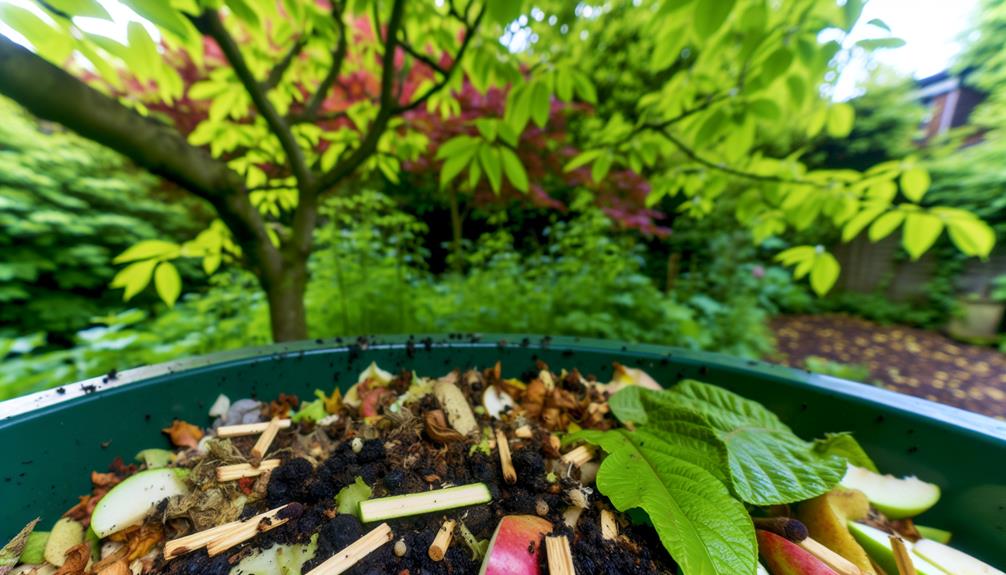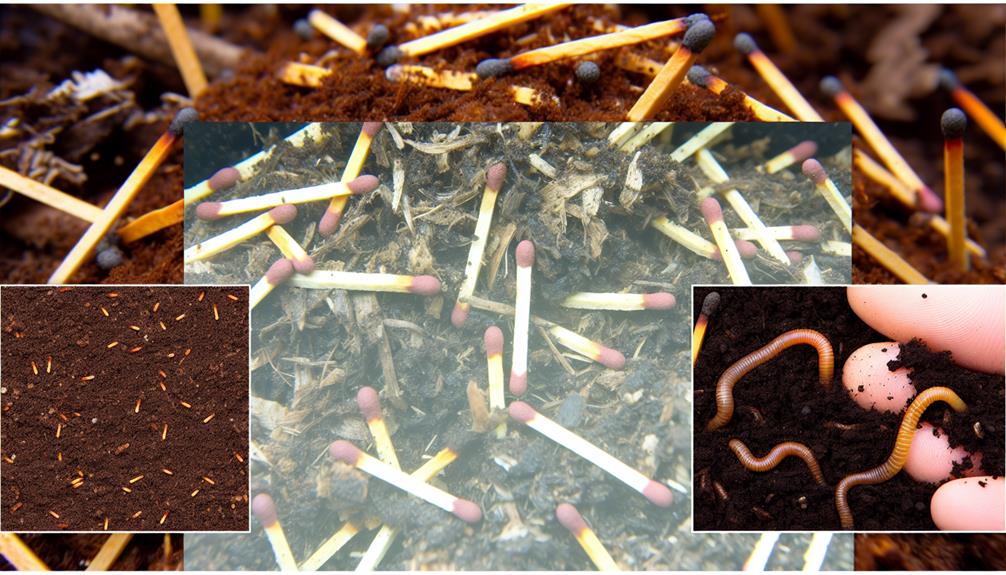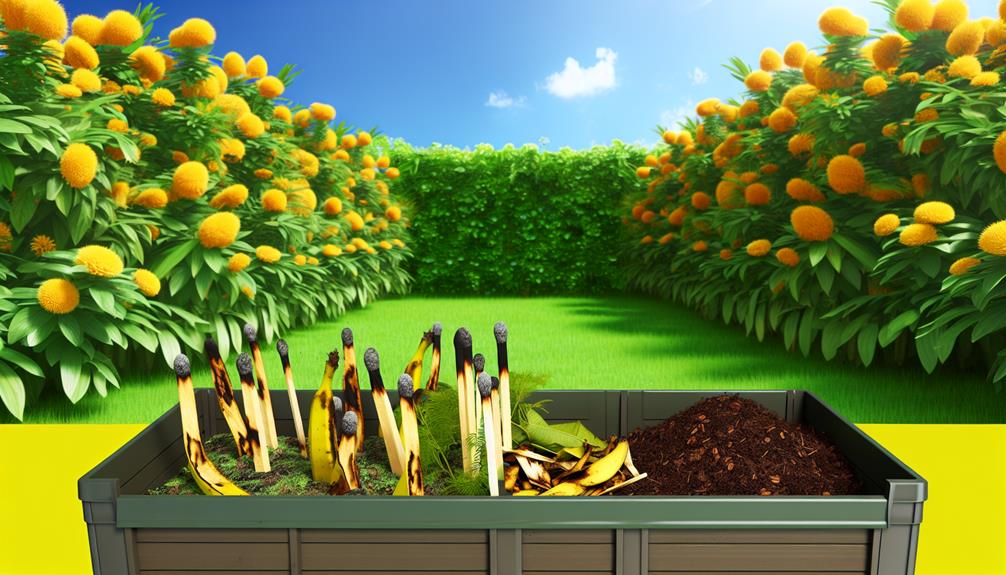

You can compost used matches, but be cautious due to the chemicals in the match heads like potassium chlorate and sulfur. These substances can disrupt microbial balance and slow decomposition. Double-check matches are fully extinguished and break them into smaller pieces to evenly distribute any chemicals.
Wooden match sticks and paper matches are biodegradable, but they decompose slowly. Adding only small amounts to your compost pile will minimize any potential negative impacts. Safe disposal alternatives include soaking in water, drying, and placing in a waste bin. If you stick around, you’ll discover more tips on eco-friendly fire-starting options.
When you look closely, matches are composed of a small wooden stick or paper stick, a head made of chemicals, and a coating of wax or paraffin. These matches come in various types, each with unique materials. Understanding the composition helps determine if they’re suitable for composting.
You’ll find two main types of matches: safety matches and strike-anywhere matches. Safety matches require a special striking surface, typically found on the matchbox, while strike-anywhere matches can ignite on any rough surface. The wooden sticks, often made from white pine or aspen, are generally biodegradable. Paper stick matches, commonly found in matchbooks, are also compostable.
The head of the match is where things get more complex. It contains a mix of chemicals designed to ignite when struck. These chemicals vary but usually include potassium chlorate, sulfur, and fillers. While the wood or paper stick can break down in a compost pile, the chemical residue from the match head mightn’t be as straightforward.
To compost used matches effectively, make sure you’re only adding the burnt wooden or paper sticks. Avoid adding unburnt match heads to your compost to prevent any potential chemical contamination.
Also Read: Can You Compost Body Wash?
Taking into account the chemicals in match heads is essential to guarantee that your compost remains safe and uncontaminated. Matches often contain chemicals like phosphorus, potassium chlorate, and sulfur. While these elements help ignite the match, they can leave behind chemical residues that might pose strike hazards if not properly managed.
When you add used matches to your compost, the chemicals from the match heads can potentially disrupt the microbial balance. You want to maintain a healthy compost pile, so it’s important to take into account the impact of these residues. The phosphorus and potassium chlorate, for example, can be harmful in large quantities.
To mitigate these risks, always make sure that the matches are fully extinguished. Allow them to cool completely to eliminate any strike hazards. Breaking them into smaller pieces can also help distribute any remaining chemicals more evenly throughout the compost. This reduces the chance of concentrated pockets of residues.
Adding used matches to your compost can influence its overall quality, so it’s important to understand the potential effects.

First off, match decomposition is a slow process. Matches are typically made from wood, which is an organic content, but the heads often contain chemicals like phosphorus and sulfur. These elements can affect the nutrient balance in your compost.
When considering composting used matches, keep in mind:
To guarantee used matches don’t harm your compost or the environment, explore safe disposal methods that mitigate potential risks.
First, guarantee burn prevention by soaking the used matches in water. This step is essential, as it eliminates the possibility of any remaining embers igniting materials in your compost or trash.
Next, consider odor management. Matches contain chemicals that can produce unpleasant smells if not disposed of properly. After soaking, dry the matches before placing them in a sealed container. This prevents any lingering odors from affecting your home or compost area.
Once the matches are dry, you can safely dispose of them in your regular trash. If you prefer an eco-friendlier option, you can also place them in a dedicated waste bin for materials that aren’t suitable for composting. This method ensures that the matches won’t interfere with the delicate balance of your compost pile.
Also Read: Can You Compost Blood?
Consider shifting to reusable or biodegradable matches as eco-friendly alternatives to traditional wooden matches. These options not only reduce waste but also align with your sustainable gardening practices. Embracing these alternatives can contribute to a more eco-conscious lifestyle and help you feel connected to a community of like-minded individuals working towards a healthier planet.

Here are some suggestions to make your switch smoother:
Using these alternatives, you can reduce the waste that ends up in your compost bins. This change not only benefits your sustainable gardening efforts but also supports a more environmentally friendly lifestyle. By opting for these eco-friendly solutions, you contribute to a greener world and inspire others in your community to do the same.
You’ll find benefits to composting used matches, like reducing your carbon footprint and cutting down waste. By composting, you’re contributing to a greener community that values sustainability and environmental responsibility.
You’re probably wondering about the decomposition factors for matches in compost. Generally, they take a few months to a year to break down, depending on conditions like moisture and temperature, aiding in the overall organic breakdown.
Yes, they can. To guarantee pest prevention and effective insect control, don’t compost used matches. They might attract pests or insects, making your compost bin less manageable and less welcoming for your thriving garden community.
You should break the used matches into smaller shards before adding them to compost. Breaking down the wooden sticks helps them decompose faster, making your composting process smoother and more efficient, fostering a thriving, eco-friendly community.
When composting matches, you might wonder if it affects soil acidity. Don’t worry, the wood breakdown process is slow and minimal, so it won’t greatly alter your compost’s pH levels. Keep your garden eco-friendly!
In conclusion, you shouldn’t compost used matches due to their chemical additives which can harm your compost quality. Instead, dispose of them in the trash or consider eco-friendly alternatives like matches made from natural materials.
By making informed choices, you can maintain a healthy compost and contribute to environmental sustainability. Always check product labels for compostable options and stay mindful of what you’re adding to your compost pile.
